THE OCCUPY MOVEMENT & HISTORY:
A recent survey of Americans under 30 revealed some surprising gaps in their knowledge of America and of the world.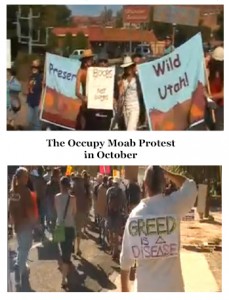 Three in ten could not locate the Pacific Ocean on a map. Seven out of ten couldn’t find New Jersey. One of ten was unable to identify the United States itself. And while polls show that most young Americans support the Occupy Wall Street movement, you have to wonder if many of them would be able to find the location of the nearest protest.. Questions about American history have provided similar results. In what war did President Franklin Roosevelt serve as Commander-in-Chief? A strong minority said the Civil War. The mind, once again, boggles.
Three in ten could not locate the Pacific Ocean on a map. Seven out of ten couldn’t find New Jersey. One of ten was unable to identify the United States itself. And while polls show that most young Americans support the Occupy Wall Street movement, you have to wonder if many of them would be able to find the location of the nearest protest.. Questions about American history have provided similar results. In what war did President Franklin Roosevelt serve as Commander-in-Chief? A strong minority said the Civil War. The mind, once again, boggles.
The most practical application of the study and knowledge of history is its value as a learning tool. Wisdom is a trial and error process; it always has been, and in that respect, we have for the most part failed miserably. It was, after all, Chief Justice Earl Warren, who eulogized at President Kennedy’s funeral in November 1963, “The only thing we learn from history is that we do not learn…But we must learn.”
Five years later, assassins shot down Martin Luther King and then Robert Kennedy, and the country committed itself to four more years of conflict in Vietnam and the deaths of 20,000 more young American soldiers and hundreds of thousands of Vietnamese men, women and children.
In the past I took Earl Warren’s comments to mean that we ignored the lessons of history—that we looked at history, analyzed its implications, and then foolishly chose to repeat the mistake. I didn’t anticipate that the day would come when history itself might be on its way to extinction. It’s difficult to learn from history or even reject it, when you don’t know it exists.
I was a kid when President Kennedy was assassinated in Dallas, and for years the date of his death served as a marker or reference point in my life and for everyone else who experienced that terrible black Friday afternoon.
A couple months later, National Geographic published a memorial edition; its president and editor, Melville Bell Grosvenor, wrote the tribute and I remember being struck by his first paragraph:
“Only the future can assign to John Fitzgerald Kennedy his true place in history. But this I know: When men now boys are old, in a distant time beyond the year 2000, they will say, ‘I remember. I remember when they brought him home, the murdered president, from Dallas…’”
I was one of those boys and seeing the number “2000” in print was impossible to comprehend at the time. The date seemed a lifetime away and indeed it was; yet it has all happened so quickly. For years, I’d ask new friends and acquaintances, “Where were you when Kennedy was shot?” Then, after 1968, it was necessary to identify which Kennedy I was referring to. As the years passed and my friends became younger, I’d ask, “Were you old enough to remember the Kennedy assassinations?” Still later, as my friends became even younger, the question still evolved. “Were you alive when the Kennedys were shot?”
Today, in many cases, it’s almost fair to ask, “Have you ever heard of John F. Kennedy?” Many Americans under 30 know that JFK had a lot of hair and a lot of sex. And that’s it. They don’t know about the Bay of Pigs, or the Cuban Missile Crisis, or James Meredith at Ol’ Miss, or Medgar Evers, or the Test Ban Treaty, or the Apollo Moon Program, or the standoff against Big Steel, or the March on Washington and civil rights legislation.
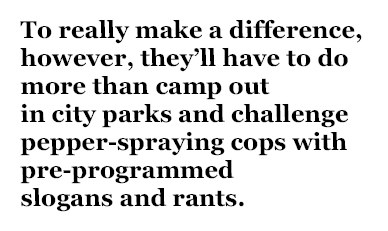 All that happened then is what makes us who we are today. And maybe that’s why we all seem so adrift. How can we know where we’re going, if we don’t know where we’ve been?
All that happened then is what makes us who we are today. And maybe that’s why we all seem so adrift. How can we know where we’re going, if we don’t know where we’ve been?
Media pundits have lately been attempting to draw parallels between these perilous times and the Sixties. It’s easy to forget through the haze of time that as late as 1968, most Americans supported the war in Southeast Asia. Protests came from a loud and dedicated minority and was composed almost exclusively of students. Until recently, I was hard pressed to find any outrage coming from anyone, of any age. I heard laments or excuses of frustration (“We can’t change anything.”), but it looked more like indifference to me. And perhaps it’s because so very few young Americans realize that we’ve done all this before. Over and over.
On one level, the Occupy Wall Street Movement gives me newfound hope. FINALLY! I keep thinking, the youth of our country are waking up and I hope they can sustain the fervor. And I hope more and more citizens of all ages and backgrounds join the ranks.
To really make a difference, however, they’ll have to do more than camp out in city parks and challenge pepper-spraying cops with pre-programmed slogans and rants. They need to be persistent–outlasting the bastards is always the most effective strategy—but they also need information. They need to understand why they’re there. And their cause has to be broad enough, and their demands encompassing enough, to project decency and compassion and integrity for ALL of the 99%. Maybe even for the cop who sprayed them.
The history of war and hate and greed and violence, of the men and women who caused it, and those who strove to stop it, is all there to be studied and learned from. History is not a recitation of dates and names and places. It is a chronicle of cowardice and courage. Of lost causes that were won and others that stayed lost. Of hopeless lives that clung to hope nonetheless, and found redemption and rebirth in the process. History is a savage tale of cruelty and greed and violence, but also a story of compassion and beauty and love. History contains multitudes.
More than anything, it is a blueprint for the future. The technology may change. The sophistication of its players may become more refined. But the story line rarely fluctuates.
History doesn’t just happen; it’s made. It’s being made right now. And it is possible learn from our mistakes. Sooner or later, somebody’s bound to get it right.
Right?
JUST WHO is OCCUPYING WHOM? (“I’m shocked! I’m shocked…”)
The issue seems so clear cut.
At one end of the room are the 99%, the overwhelming majority of the population. US. We are the hardworking, underpaid, unemployed Americans with staggering mortgages or without a home at all that are being left behind by the very few.
Standing opposite us, and towering over us at a considerable height is the 1%, the tiny fraction of men and women who, through skill or luck or guile or deceit or the circumstances of their birth, control the vast majority of this country’s wealth.
The Have’s vs the Have-nots. The Good versus the Evil. The Righteous vs the Wrong. How I like a black & white fight.
Unfortunately, this isn’t one of them, though I’ve even deluded myself at times. In fact, the battle lines are so muddled and confused, so intersected and entwined with an infinite variety of grey zones and half truths and misconceptions, that trying to find some objectivity in all this—searching for that cleansing moment of cleansing clarity and truth—is all but impossible.
In fact, the truth, these days, has about as much value as the “warm pitcher of piss” John Nance Garner once used to describe the office of the vice president.
The Truth will get you nowhere but a half truth just might win you a prize. But at this point in my “journalistic career,” what have I got to lose?
First let me be clear—the point here is NOT by any means to defend the 1%. Hardly. They deserve every unkind word we can utter, every sharp pin in the Wall Street Voodoo Doll we can stick in them.
But every day, in ways we may not even be able to imagine, we enable these people, we make them stronger, and we encourage their arrogance, even while we allegedly wage war against them. They know this and they’re laughing at us, every moment of every day. We make it possible for them to succeed. We are, in fact, responsible for their success and some of us even reap the same benefits, though on a much smaller scale; yet most of us don’t even know we’re involved. Our complicity is matched only by our naivety.
Let me give you an example.
Who hates the oil companies? Who sees double when the price of gasoline skyrockets and then we hear ExxonMobile or ConocoPhillips or British Petroleum announce record profits again? We all complain bitterly about the fat cat CEOs who walk away with staggering salaries and obscene bonuses. No argument here. Executive greed is obscene. We want blood from these companies.
But who are the companies? When we talk about oil company greed, what and who are we really talking about?
Most corporate profits don’t go into the pockets of their senior officers. Corporations are owned by their shareholders. The men and women who run these companies believe their first responsibility is to them. It is a sign of the times that corporate leaders feel very little loyalty to their own workers–to the thousands of employees who, by their hard work and sweat, help make the company profitable to begin with.
But who are the shareholders? Are they predominantly the ‘rich weasels’ we’d like to believe they are?
A couple years ago, economist Robert J. Shapiro tried to find out. Shapiro served in the Clinton administration as undersecretary of commerce for economic affairs and was a key economic adviser to Al Gore and John Kerry in their presidential campaigns. He is also a co-founder of the Progressive Policy Institute, a “think tank” affiliated with the Democratic Leadership Council. He is not a member of the Tea Party or a friend of Grover Norquist. His findings are interesting. Shapiro discovered the following:
* Almost 43 percent of oil and natural gas company shares are owned by mutual funds and asset management companies that have mutual funds. Mutual funds manage accounts for 55 million U.S. households with a median income of $68,700.
* Twenty seven percent of shares are owned by other institutional investors like pension funds. In 2004, more than 2,600 pension funds run by federal, state and local governments held almost $64 billion in shares of U.S. oil and natural gas companies. These funds represent the major retirement security for the nation’s current and retired soldiers, teachers, and police and fire personnel at every level of government.
* Fourteen percent of shares are held in IRA and other personal retirement accounts.
* Forty five million U.S. households have IRA and other personal retirement accounts, with an average account value of just over $22,000.
In other words, whether we knew it or not, many of us had a vested interest in and greatly benefitted from oil company profits, while we simultaneously cursed them for their excesses. If you’re a school teacher, a city employee, a cop, or if you maintain a small IRA mutual fund, most likely, at least some of your retirement income comes from oil company profits.
Last year, as BP stocks plummeted after the Gulf of Mexico oil spill, UK citizens were in panic mode as they watched their retirement incomes collapse. These weren’t greedy capitalists, they were middle-class citizens like you and me, who had hopes of some kind of nest egg for their senior years. It’s the same story, different country. In the end, pointing fingers at the oil companies and holding them entirely responsible for all these disasters is hypocritical if we don’t acknowledge our own complicity.
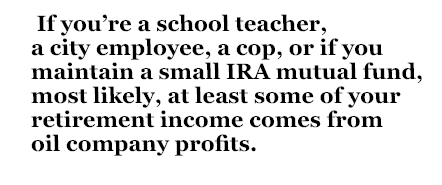 And the contradictions don’t stop with Big Oil. Big Business is so deeply entrenched in the lives of the 99%, extracting ourselves from Corporate America will be far more complicated than holding placards and signing facebook petitions.
And the contradictions don’t stop with Big Oil. Big Business is so deeply entrenched in the lives of the 99%, extracting ourselves from Corporate America will be far more complicated than holding placards and signing facebook petitions.
As long as we create the demand and as long as we exhibit an insatiable desire to live the excessive consumptive lifestyle we believe is an entitlement, the capitalist system will keep looking for products to sell us. And as long as we invest in these companies and expect a great return on our investment, we can hardly condemn their actions unless we condemn our own as well.
This is the hard truth that no entrenched “progressive” wants to acknowledge. Until we do, our credibility is laughable.
THE GHOSTS of CHRISTMAS PAST?
The Best is Yet to Come
For most of my adult life, Christmas and I have been at odds with each other. I don’t like shopping and I don’t like malls. When they started running Christmas shopping commercials before Halloween, I got off that bus real fast.
After I left Kentucky and moved to Utah, I never had a family of my own to celebrate with. Though I received many invitations to be with friends over the years, I usually declined. I wanted my own special memories.
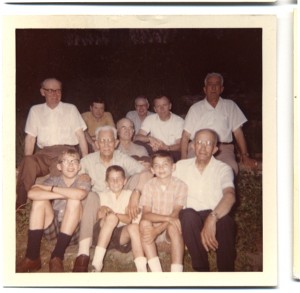 I wanted the kinds of memories I had as a kid, especially those first ten or twelve years. I was lucky to have all of my grandparents alive and well for the first two decades of my life and that made all the difference. We really did go over the river and through the woods, multiple times, over the holidays. I will always cherish the warmth and affection and love that wrapped and comforted all of us grandkids during those remarkable times.
I wanted the kinds of memories I had as a kid, especially those first ten or twelve years. I was lucky to have all of my grandparents alive and well for the first two decades of my life and that made all the difference. We really did go over the river and through the woods, multiple times, over the holidays. I will always cherish the warmth and affection and love that wrapped and comforted all of us grandkids during those remarkable times.
AND the food was pretty remarkable too. My grandmothers had their own specialties but they always managed to put together a feast so effortlessly. Of course, it just looked that way. We’d have Christmas Eve dinner at Grandma Stiles’, then Christmas Day dinner at the Montforts, then back to the Stiles homestead for leftovers on Christmas Night. By the day after, none of us could move.
I missed those days. Nothing seemed to measure up. For many years, I ignored Christmas and Christmas ignored me. It was a standoff.
I hit rock bottom a couple years ago. I’d decided to throw caution to the wind and start a new life in Australia. I pulled up my Utah roots and moved all my stuff there. I was ready to start talking like an Aussie. I was saying “Bloody Hell,” a lot.
But it was a disaster. Instead of a new life, I found myself living out of a 1983 Datsun pickup truck, eating Nobby’s peanuts and canned tuna most of the time, wondering what the hell I was doing there. As Christmas approached, I considered just sleeping through it but in the Southern Hemisphere, December means summer and soaring hot temperatures. Just too damn hot to snooze.
I decided I’d make the most of it though. I picked one of my favorite camping spots, a lovely little paddock along the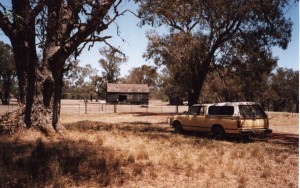 Blackwood River beside Jayes Bridge. An old sheep shearing shed still stands by the river, surrounded by lovely old gum trees. I’d pitch my tent, find the shade to hunker down in, and listen to some good cricket. It would be okay.
Blackwood River beside Jayes Bridge. An old sheep shearing shed still stands by the river, surrounded by lovely old gum trees. I’d pitch my tent, find the shade to hunker down in, and listen to some good cricket. It would be okay.
But what about Christmas Dinner? Turkey was out. There’d be no stuffing or mashed potatoes or cranberry sauce or green bean casserole. I would have to do without it all. But there was one unique Stiles Family Christmas Eating Tradition I could still approximate. My mother always prepared a simple little pre-dinner hors d’oeuvre . She’d blend cream cheese and diced green olives and spread them on celery sticks. Sometimes I liked them more than the turkey. So on my way to Jayes Bridge, I stopped in Boyup Brook for the ingredients. The little store had everything I needed and I thought, ‘With stuffed celery sticks, Christmas can still be good.’ I drove out 30 miles of gravel road to my little pasture. It was hot but I was alright with it. It was helping to keep the flies in check.
Sometime late in the afternoon, it occurred to me I’d forgotten to buy ice. Would the cheese survive? I decided not to worry about it.
Next day dawned hot. By 10 o’clock, the thermometer was pushing 100 degrees. I thought maybe I should have my celery cheese sticks for Christmas Brunch. I looked at my Philly cheese—it had lost its smooth consistency and looked a bit…I don’t know…curdled? But I was desperate to preserve this holiday tradition, so I prepared my ‘meal’ and proceeded to eat the whole stalk, curdles and all.
About an hour later, lying in my tent in full sunlight, I began to feel funny. Really funny. And then there was nothing funny about it at all. My head was swimming, the light began to change to a strange neon glow and I could barely see my hands in front of my face. The world spun. I kept seeing the shearing shed race about the paddock. Trees uprooted themselves and danced in the sky. More than anything else in the world, I wanted to find the toilet paper. It was somewhere in the truck. I staggered out of the tent groping for the door handle. I had literally gone blind. I reached into a box and felt some paper towels and ran for a tree. I had heard the expression ‘running from both ends’ before, but had never experienced the thrill of it until now. I lost about five pounds in less than a minute.
And like that, it was over.
I drank a lot water and ate nothing for about three days. Finally I went to Perth and had two Big Macs and super-sized the fries. I swore I’d never celebrate Christmas again.
 That was three years ago. For any of you who are reading this and thinking, ‘yeah, my luck’s about as bad as Stiles’ and maybe worse,’ I offer you hope. Things can get better. They may not, but they might. I stayed the course, survived the cream cheese, endured yet another personal defeat, and came back to the States, determined to stay out of trouble, and just watch cowboy movies and drink Dr. Pepper for a few years. Instead I met Tonya Morton, we got married on October 1 and now we look forward to a brilliant Christmas and many more to come. We’ve already bought our tree and I have every intention of restoring my celery cream cheese and olive tradition. I plan to refrigerate them this time.
That was three years ago. For any of you who are reading this and thinking, ‘yeah, my luck’s about as bad as Stiles’ and maybe worse,’ I offer you hope. Things can get better. They may not, but they might. I stayed the course, survived the cream cheese, endured yet another personal defeat, and came back to the States, determined to stay out of trouble, and just watch cowboy movies and drink Dr. Pepper for a few years. Instead I met Tonya Morton, we got married on October 1 and now we look forward to a brilliant Christmas and many more to come. We’ve already bought our tree and I have every intention of restoring my celery cream cheese and olive tradition. I plan to refrigerate them this time.
To read the PDF version of this article, click HERE
And don’t forget our loyal backbone members!


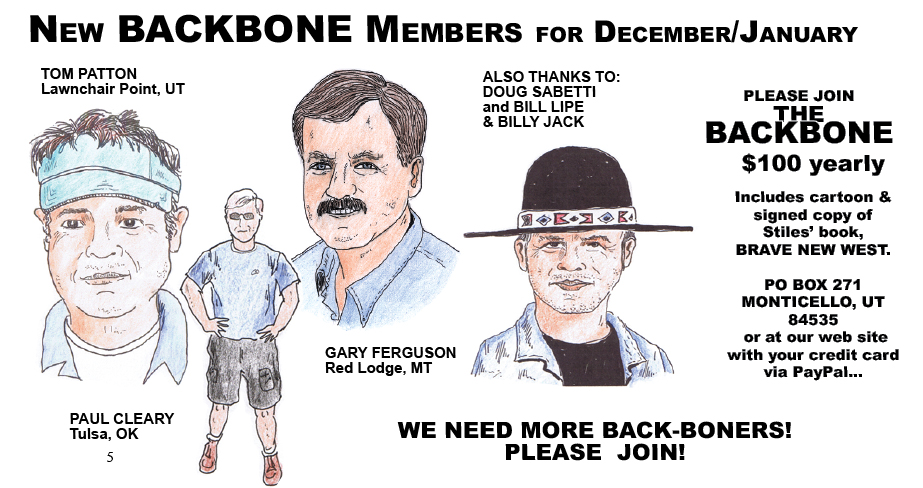
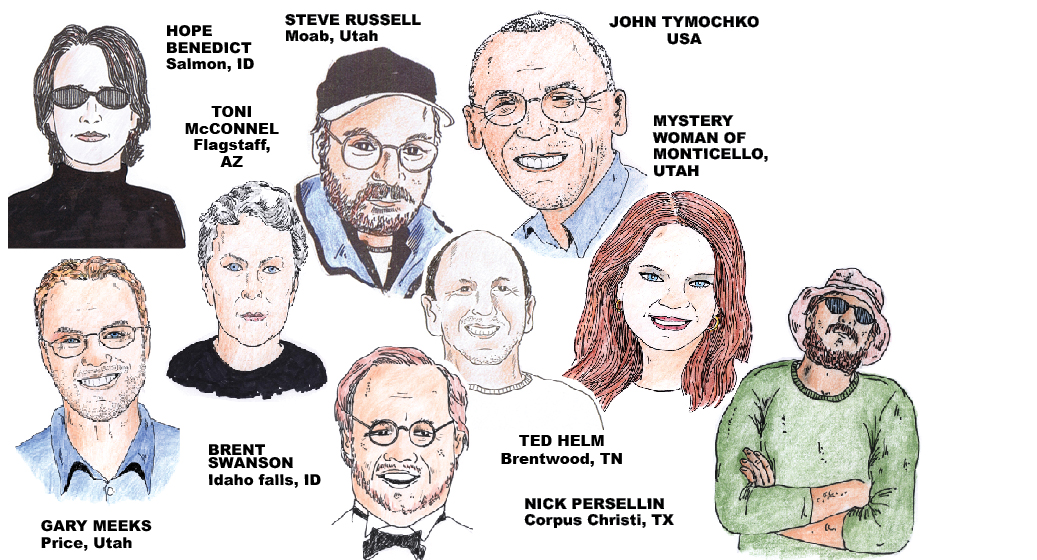
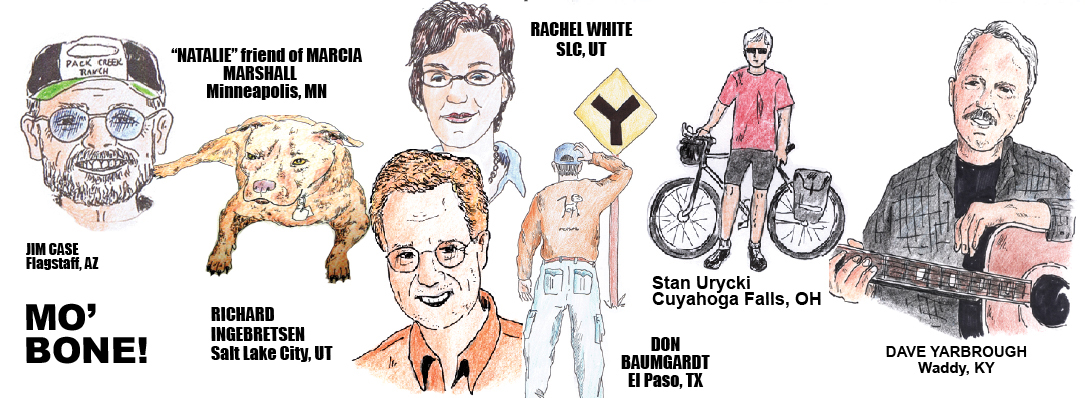
Teary eyed for most of your history lesson – ah yes I remember it well. Thankfully I know where the United States sits on the globe and most of the middle east. Africa and Eastern Europe get trickier as they insist on changing country names. Personally Yugoslavia and The Belgian Congo are forever stuck in my cranium.
Although I’m happy you’re now happily married and find hope in your personal success it was a big leap of story line. What happened after Australia and before Tonya?
Re: Just Whom is Occupying Who? (was that how Stiles said it?)
Gail and I haven’t had our money in stocks for many years, largely because I couldn’t stand the thought of funding sweatshops overseas. But even with effort it’s difficult to avoid indirect financial culpability. I do know that lifestyle gets involved: are we willing to have less money in order not to feed the destructiveness?
Enjoyed reading “Ghosts of Christmas Past, the best is yet to come” article, Jim.
Excellent observations about Occupy. … Now, what to do about it? What are those demands?
enjoyed it. all of it. Tonya looks lovely. yer a lucky man, Jim.
Here’s the deal man. You write some cool stuff, and the Zephyr is awesome. But this article is weak. You go on for paragraphs about JFK and living in a truck in Australia. JFK and your truck in Australia have absolutely nothing to do with the Occupy Wall Street movement. There aren’t a lot of jobs here. Young people are going into very massive debt just to get a basic education that won’t even guarantee them any kind of job that will let them pay that debt back. There’s wars going on killing a lot of people and wasting all the money. People are depressed and stressed and broke and they work their ass off and are still in debt and miserable. That is seriously fucked up and we need to think very hard and intelligently about how this great exciting movement can become something actually effective for change.
You critique the movement. I hear you. I got a lot of critiques of the movement. Here’s a bunch of them: http://laughingfish.blogspot.com/2011/11/lessons-and-repression.html
But what you’re doing here isn’t investigative journalism, much less anything helpful. You’re not saying, “over here, the movement did this, and it was really good, and maybe if we did that more the movement would be better.” You’re not saying, “here’s something we can learn, or here’s a better way to do things.” You’re just typing out a bunch of completely unrelated autobiographic stuff, and that isn’t very helpful at all to anyone or anything. So what the hell man?
As always Jims writing brings a smile and sometimes a tear or two. RIP